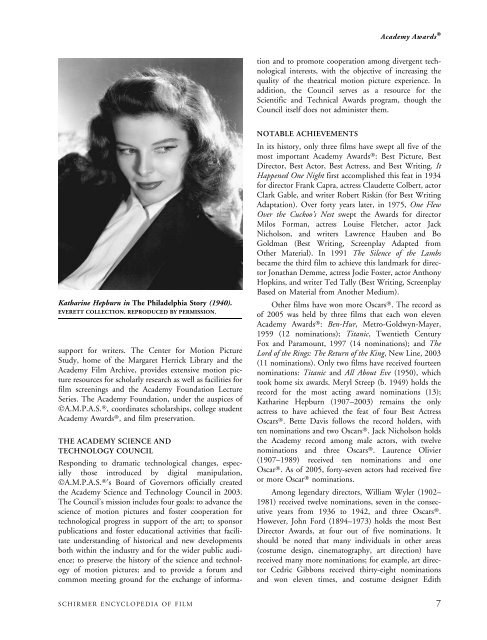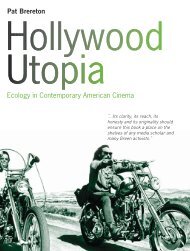Schirmer Encyclopedia of Film
Schirmer Encyclopedia of Film
Schirmer Encyclopedia of Film
You also want an ePaper? Increase the reach of your titles
YUMPU automatically turns print PDFs into web optimized ePapers that Google loves.
Katharine Hepburn in The Philadelphia Story (1940).<br />
EVERETT COLLECTION. REPRODUCED BY PERMISSION.<br />
support for writers. The Center for Motion Picture<br />
Study, home <strong>of</strong> the Margaret Herrick Library and the<br />
Academy <strong>Film</strong> Archive, provides extensive motion picture<br />
resources for scholarly research as well as facilities for<br />
film screenings and the Academy Foundation Lecture<br />
Series. The Academy Foundation, under the auspices <strong>of</strong><br />
ÓA.M.P.A.S. Ò, coordinates scholarships, college student<br />
Academy Awards Ò, and film preservation.<br />
THEACADEMYSCIENCEAND<br />
TECHNOLOGY COUNCIL<br />
Responding to dramatic technological changes, especially<br />
those introduced by digital manipulation,<br />
ÓA.M.P.A.S. Ò’s Board <strong>of</strong> Governors <strong>of</strong>ficially created<br />
the Academy Science and Technology Council in 2003.<br />
The Council’s mission includes four goals: to advance the<br />
science <strong>of</strong> motion pictures and foster cooperation for<br />
technological progress in support <strong>of</strong> the art; to sponsor<br />
publications and foster educational activities that facilitate<br />
understanding <strong>of</strong> historical and new developments<br />
both within the industry and for the wider public audience;<br />
to preserve the history <strong>of</strong> the science and technology<br />
<strong>of</strong> motion pictures; and to provide a forum and<br />
common meeting ground for the exchange <strong>of</strong> informa-<br />
Academy Awards Ò<br />
tion and to promote cooperation among divergent technological<br />
interests, with the objective <strong>of</strong> increasing the<br />
quality <strong>of</strong> the theatrical motion picture experience. In<br />
addition, the Council serves as a resource for the<br />
Scientific and Technical Awards program, though the<br />
Council itself does not administer them.<br />
NOTABLE ACHIEVEMENTS<br />
In its history, only three films have swept all five <strong>of</strong> the<br />
most important Academy AwardsÒ: Best Picture, Best<br />
Director, Best Actor, Best Actress, and Best Writing. It<br />
Happened One Night first accomplished this feat in 1934<br />
for director Frank Capra, actress Claudette Colbert, actor<br />
Clark Gable, and writer Robert Riskin (for Best Writing<br />
Adaptation). Over forty years later, in 1975, One Flew<br />
Over the Cuckoo’s Nest swept the Awards for director<br />
Milos Forman, actress Louise Fletcher, actor Jack<br />
Nicholson, and writers Lawrence Hauben and Bo<br />
Goldman (Best Writing, Screenplay Adapted from<br />
Other Material). In 1991 The Silence <strong>of</strong> the Lambs<br />
became the third film to achieve this landmark for director<br />
Jonathan Demme, actress Jodie Foster, actor Anthony<br />
Hopkins, and writer Ted Tally (Best Writing, Screenplay<br />
Based on Material from Another Medium).<br />
Other films have won more OscarsÒ. The record as<br />
<strong>of</strong> 2005 was held by three films that each won eleven<br />
Academy AwardsÒ: Ben-Hur, Metro-Goldwyn-Mayer,<br />
1959 (12 nominations); Titanic, Twentieth Century<br />
Fox and Paramount, 1997 (14 nominations); and The<br />
Lord <strong>of</strong> the Rings: The Return <strong>of</strong> the King, New Line, 2003<br />
(11 nominations). Only two films have received fourteen<br />
nominations: Titanic and All About Eve (1950), which<br />
took home six awards. Meryl Streep (b. 1949) holds the<br />
record for the most acting award nominations (13);<br />
Katharine Hepburn (1907–2003) remains the only<br />
actress to have achieved the feat <strong>of</strong> four Best Actress<br />
OscarsÒ. Bette Davis follows the record holders, with<br />
ten nominations and two OscarsÒ. Jack Nicholson holds<br />
the Academy record among male actors, with twelve<br />
nominations and three OscarsÒ. Laurence Olivier<br />
(1907–1989) received ten nominations and one<br />
OscarÒ. As <strong>of</strong> 2005, forty-seven actors had received five<br />
or more OscarÒ nominations.<br />
Among legendary directors, William Wyler (1902–<br />
1981) received twelve nominations, seven in the consecutive<br />
years from 1936 to 1942, and three OscarsÒ. However, John Ford (1894–1973) holds the most Best<br />
Director Awards, at four out <strong>of</strong> five nominations. It<br />
should be noted that many individuals in other areas<br />
(costume design, cinematography, art direction) have<br />
received many more nominations; for example, art director<br />
Cedric Gibbons received thirty-eight nominations<br />
and won eleven times, and costume designer Edith<br />
SCHIRMER ENCYCLOPEDIA OF FILM 7
















